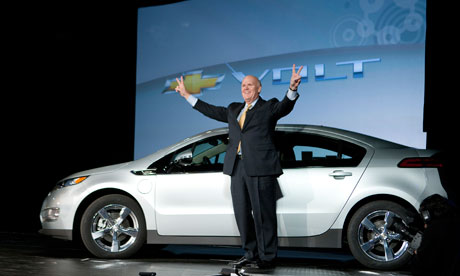
When the doors to Detroit's gargantuan auto show open at 6am Monday, more than 5,000 journalists from 50-plus countries will descend on the city's 2.4m sq ft Cobo conference center for a first look at the hottest new vehicles from the world's top auto firms.
Once again, the top car firms are showcasing electric cars and hybrid vehicles. BMW, GM, Lexus, Mercedes, Nissan, Toyota and Volvo all have new electric or hybrid cars to show off. As usual they will garner massive amounts of coverage. But will anyone buy them?
"This could be a crunch year," said Ed Hellwig of auto analyst Edmunds.com. Consumers will have access to more supply and more choices in alternative fuel cars than ever in 2012, he said.
"This could be the year when we see whether this is really ready to go mainstream or the public just aren't interested."
The signs are not good.
In the wake of the worst recession in living memory, car sales overall are creeping back, up over 10% in the US last year. But even as consumers returned to the show rooms, according to analyst WardsAuto, sales of "alternative power source light vehicles" rose just 2.3%.
Last year GM's Chevy Volt was named car of the year at the Detroit auto show, beating the Nissan Leaf. The Volt runs on a combination of battery and old school combustion engine, the Leaf is all electric – they were heralded as the first mass market electric cars. Neither has proved a hit with consumers. Both missed their 10,000 vehicle sales targets for the year, Nissan by a fraction and Volt by over 2,000.
By comparison Toyota sold 308,510 combustion-engine Camrys last year.
To make matters worse for GM, the Volt is currently being investigated by the National Highway Traffic Safety Administration because its batteries caught on fire in the weeks following three government crash tests.
Sales of hybrid cars in general have been flat for the last few years, said Anthony Pratt, director of forecasting at auto analyst Polk. Even in Europe where gas prices are far higher, the electric and hybrid market remains tiny, he said.
There will also be more cars that run on alternative fuels at the show, such clean-diesel, possibly including the first diesel passenger car from a US maker. But analysts are skeptical that these cars will make inroads in the marketplace for at least five years or more.
That's because alternative fuel cars are now competing with vehicles from manufacturers who have undergone a Damascene conversion to energy efficiency: more efficient combustion engines are cutting fuel consumption by 15% to 25% in some newer vehicles, according to Brandon Mason, senior analyst at PwC's Autofacts group.
"There are a lot of very competitive and fuel efficient cars out there right now," he said.
Still, Mason contends the annual hype over electric and hybrid cars, and increasingly, alternative fuels, isn't without merit.
"With any new technology you need time to bring the price down and get the infrastructure right," he said. "That is going to take some time."
Over the longer term, alternative fuels are set to receive some significant boosts. The US government has asked car manufacturers to make 35.5 miles per gallon (mpg) standard by 2016, way above the 22mpg average today but still within reach of old technology.
By 2025 the US wants manufacturers to have doubled fuel efficiency. On top of that some states, including California, now require manufacturers to have at least one zero-emission car in their fleets. Over time these factors should help boost alternative fuels sales.
And in the meantime few expect the auto makers to cut back their heavy investment in new technologies. "It's the price of poker," says Pratt. The manufacturers have to be involved in the latest technology, he said. "But that technology is in its infancy and the next five years could be even more challenging."

